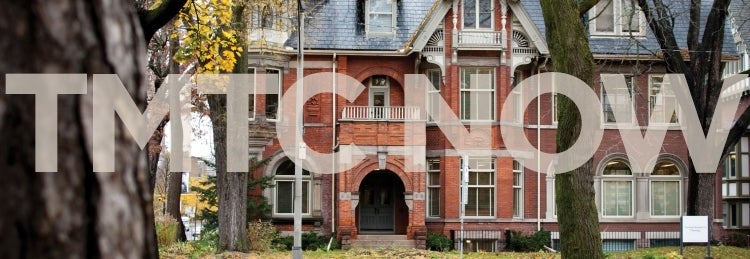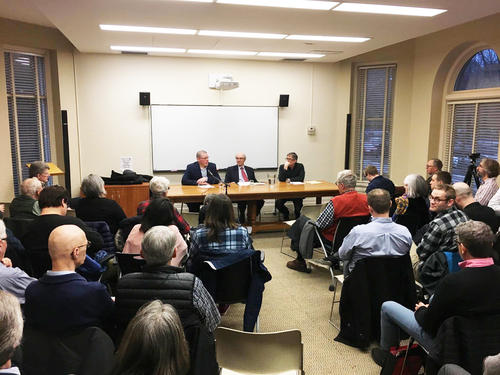
Volume 12, Number 1, Fall 2019
From the Directors Desk
 By Kyle Gingerich Hiebert, TMTC Director
By Kyle Gingerich Hiebert, TMTC Director
Central to TMTC’s activities in Toronto are our monthly scholars forums, which draw together a range of scholars working in a diverse range of disciplines, both from Mennonite and, increasingly, non-Mennonite denominations. These forums are a place to test out and receive engaged feedback on work in progress though we do not usually have opportunities to see first-hand the subsequent impact such engagements have on shaping scholarship. This year we had the distinct privilege of seeing some of those fruits in full blossom.
TMTC Senior Fellow John Rempel kicked off our monthly series of forums last October by sharing some of his ongoing work on the Trinity and followed this up in March by giving our inaugural TMTC Public Lecture, in which he expanded upon and re-worked some of the material he presented earlier in the year. Both the forum and lecture were very well attended and I’m delighted that John’s lecture will be published in an upcoming special issue of the Conrad Grebel Review alongside engagements that seek to propel the conversation forward from a number of other scholars. Nurturing this kind of dialogue that strives to move beyond comfortable certitudes by intentionally crossing ecumenical and disciplinary lines is an important part of TMTC’s work.
We are looking forward to another rousing series of scholars forums this year and planning is underway for the next TMTC Graduate Student Conference, which will be taking place at Eastern Mennonite University from 18–20 June 2020. The planning committee has chosen the theme “Hope, Despair, Lament” and we are looking forward to building on the momentum of the last conference in Toronto so keep an eye out for the call for papers and spread the word amongst graduate students you know.
This past year TMTC also bid a fond farewell to Pablo Kim Sun who wrapped up his time as Administrative Assistant in June and began a new role with the Canadian Council of Churches while he completes his PhD. Huge thanks to Pablo for his thoughtful and engaged service over the years and we’re glad his new workplace has only taken him across the hall! We are also delighted to welcome Emma CW Ceruti, a PhD student at Emmanuel College, to the role of Administrative Assistant and are looking forward to the energy and life that she will undoubtedly bring to the TMTC community.
We are also looking forward to welcoming members of the TMTC Advisory Council to Toronto to think together about TMTC’s future. 2020 is TMTC’s 30th anniversary and we will be reflecting on TMTC’s impact over the past three decades and beginning to imagine what shape and role TMTC might have in the future of theological education in North America and beyond. I would welcome your input on this and would also invite your prayers as we gather to think about TMTC’s future together.
Finally, I want to acknowledge the passing of three long-term supporters, and friends of TMTC, Margaret Loewen Reimer, Alan Armstrong, and Jim Blair. We shall miss their presence with us. Eternal rest grant unto them, O Lord, and let perpetual light shine upon them. May they rest in peace. Amen.
Angelican-Mennonite Dialogue in Canada
By Kimberly L. Penner, TMTC Research Fellow
In 2016, the Anglican Church of Canada and Mennonite Church Canada made a commitment to engage in a bilateral dialogue. The dialogue was initiated by the Anglican Church of Canada with a mandate to work at “receptive ecumenism,” or, a “mutual exchange of gifts”. Representatives from each tradition met for the first time in 2018 and then again most recently May 24-26 of this year in Winnipeg, MB. As articulated by the Anglican Church of Canada in a summary article, the goals of the dialogue include:
- Encouraging greater mutual understanding of the distinctive histories, spiritualities, and theologies of the Anglican and Mennonite expressions of Christian faith and life.
- Identifying areas where Canadian Mennonite have gifts from their traditions to share with Canadian Anglicans, and where Canadian Anglicans have gifts from their traditions to share with Canadian Mennonites.
- Communicating the fruits of the dialogue to the constituencies of the two churches at all levels.
- Helping to facilitate greater contact and collaboration in mission and ministry by Anglicans and Mennonites in Canada.
I have the privilege of being a member of this dialogue as a representative from Mennonite Church Canada. Reflecting on our meetings in May, a few things stand out to me. The gifts I see being exchanged between us thus far include: the gifts of relationship building (accompanied by a growing understanding and appreciation for each other’s traditions and theologies), the gift of sharing and learning from our histories of colonialism in Canada, and the gift of working together to imagine and live into understandings of Christian mission or the missional church that are truer to the Gospel and thus, life giving for all. At a basic, but intrinsic level, this dialogue is a conversation between particular people who have been and continue to be shaped by their ecclesial tradition in, different and similar ways—even among those of us from the same tradition. I am deeply grateful for the opportunity to grow these relationships and to learn from own another. At a national church level, I look forward to seeing exactly what fruits come out of our dialogue after more conversations and anticipate with excitement our 2020 meetings in Ontario.
TMTC Public Lecture
By Zac Klassen, TMTC Associate and PhD. Candidate at McMaster University
“Our task this evening is to go in pursuit of a mystery and its implications for how we believe and how we live our lives.”
It is with these words that Dr. John D. Rempel (BA 1966, PhD 1996) began his lecture, “An Impossible Task: Trinitarian Theology for a Radical Church?” in front of a packed audience at the Toronto Mennonite Theological Centre (TMTC). In his wide-ranging lecture, Rempel explored Trinitarian thinking from the 4th to the 20th century, noting the consistent challenges brought against it from “un-Trinitarian expressions of belief.”
Trinitarian thinking, according to Rempel, represents the church’s primal symbols and constitutes the foundational “grammar” or “first principles” of belief. That Western Christians often approach the gospel apart from such symbols and grammar constitutes a crisis in our time, said Rempel, a crisis of incoherence in the church’s witness to the God revealed in the Bible. An example of this incoherence, Rempel suggested, is put on display when considering a central ecclesial practice: the Eucharist or the Lord’s supper. Un-Trinitarian thinking results in an account of the drama of the Lord’s Supper that ultimately involves only one actor: us.
Part of Rempel’s lecture involved tracing the various sources for and manifestations of this crisis in the classical period and then later in Anabaptist-Mennonite history. Rempel’s most constructive claims, however, were worked out through an account of four 20th century thinkers: John Howard Yoder, Elizabeth Johnson, Jurgen Motlmann, and Jon Sobrino. While all critical of the tradition and thus “unruly Trinitarians,” these four theologians nonetheless remained accountable to trinitarian faith. By doing so, they demonstrate that the doctrine of the Trinity, rather than being a form of antiquated and abstract metaphysics, is a “way of thinking [that] has shown itself able to hold together in a dynamic relationship, the bible’s witness to God’s self-revelation, the creed as its symbol, and its reception across the ages.” Trinitarian grammar, while demanding “accountability,” also “allows for dissent and improvisation.” Just in this way, noted Rempel, Trinitarian thinking is also ecumenical.
More than just a rich historical and theological analysis, the lecture was offered equally as admonition. Addressing the next generation, Rempel said:
“Take the torch, those of you who are in the generation that is now taking over. Meet us at the center-point of the gospel and then trace out faithful ways of thinking and living that speak out of and into your generation.”
Following the lecture, Dr. P. Travis Kroeker (McMaster University) responded. A robust and appreciative Q&A session followed. The full lecture is available on Grebel’s YouTube channel.
TMTC Fellow Spotlight
By Sarah Kathleen Johnson, TMTC Visiting Fellow and PhD candidate at the University of Notre Dame
I often find myself in between—between communities, disciplines, and traditions—so much so that I have started to see being in-between and bridging difference as central to my vocation.
I find myself between church and academy. At present, I engage theoretical and theological questions associated with religious change and Christian worship in my academic work. At the same time, I facilitate the process of making concrete, practical decisions about songs and worship resources as a member of the editorial team of Voices Together, a new hymnal and worship book for Mennonite Church USA and Mennonite Church Canada. In the past, I have combined other pastoral roles and academic pursuits. Studying the history, theology, and practice of Christian worship informs how I shape congregational worship locally and through the creation of centralized resources. Being required to make decisions about worship that impact individuals and communities keeps me grounded in the real world rather than the realm of ideas and ideals when I pursue academic questions. The opportunity to learn from the experience of ordinary worshipers and communities draws me to ethnographic research methods.
In my academic research, I find myself between disciplines. Although I am based in the theology department and my primary training is in theology, I draw heavily on qualitative research methods, social theory, and sociology of religion literature in the types of theological questions I ask and how I go about answering them. Finding ways to equip myself to work in and across multiple disciplines on their own terms has been a central to my doctoral studies. Liturgical studies, as a discipline defined by a subject matter—anything related to Christian worship—rather than a methodology, is a good place to be a generalist who draws on theological, historical, and sociological methods. The University of Notre Dame is an excellent place to pursue interdisciplinary research related to religion since religion is a focus in many departments and I am welcome in the sociology department as a theologian.
Finally, I find myself between Christian traditions. The Mennonite church is my tradition of origin and the tradition in which I serve in leadership. I am grateful that I had the opportunity to be immersed in Anabaptist history and thought through a BA and MTS at Conrad Grebel University College before studying at the extraordinarily ecumenical Yale Divinity School and the profoundly Roman Catholic University of Notre Dame. In addition to Mennonite congregations, I have worshiped extensively in other traditions and my dissertation research primarily engages an Anglican case study. In my experience, each expression of Christianity has gifts to offer and to receive and there is a great deal to learn from and share with one another.
Being in-between can be hard work, but it is a generative space where much can be learned through questioning assumptions, sharing rich experiences, and making unexpected connections. As an interdisciplinary community of scholars and practitioners and an Anabaptist presence on an ecumenical and interfaith campus, TMTC is a good place to be in between and to continue to learn how to
bridge difference.
Recent Scholars Forums
April 2, 2019: Jordan Duerrstein, “Peace Theology among Evangelical Anabaptists: How Much of a Peace Church are we really?
March 12, 2019: Emma Ceruti, “Atonement Theology in Disability Perspective”
February 2, 2019: Gerald Ens, “Good Deaths in Wendell Berry’s Short Stories”
January 15, 2019: Jordan Balint: “The Future of Disability: Critical Eschatology and Disability in Constructive Theology”
December 5, 2018: Sarah Johnson, “The Voices Together Worship Leader Book: How can 180 pages best support leaders in shaping intentional, contextual, and theologically Anabaptist worship?
November 14, 2018: Michael Buttrey, ““Is Virtue Elitist?”
October 24, 2018: John Rempel, “An Impossible Task? Outlines of a Trinitarian Theology for [its Cultured Despisers] Today”
TMTC A. James Reimer Award
 Allison Murray is the winner of the 2018 A. James Reimer Award. She is a PhD candidate at Emmanuel College within the University of Toronto currently working on her dissertation entitled “Making, Marking, and Mandating Gender Roles: A History of Complementarian Theology, 1970-2010.” This research looks at the interplay of theology and cultural identity markers amongst anti-feminist evangelicals in the US and Canada. Throughout her years at Emmanuel Allison has been an active participant in the TMTC community. She has presented at two scholars forums and has been on the planning committee for the 2016 and 2018 TMTC Graduate Student Conferences.
Allison Murray is the winner of the 2018 A. James Reimer Award. She is a PhD candidate at Emmanuel College within the University of Toronto currently working on her dissertation entitled “Making, Marking, and Mandating Gender Roles: A History of Complementarian Theology, 1970-2010.” This research looks at the interplay of theology and cultural identity markers amongst anti-feminist evangelicals in the US and Canada. Throughout her years at Emmanuel Allison has been an active participant in the TMTC community. She has presented at two scholars forums and has been on the planning committee for the 2016 and 2018 TMTC Graduate Student Conferences.
TMTC Staff
- Kyle Gingerich Hiebert, Director
- Emma CW Ceruti, Administrative Assistant
TMTC Fellows
- Jason Reimer Greig, Research Fellow
- Lydia Neufeld Harder, Senior Fellow
- Sarah Johnson, Visiting Fellow
- Kim Penner, Research Fellow
- John Rempel, Senior Fellow
Advisory Council
- Anabaptist Mennonite Biblical Seminary
- Canadian Mennonite University
- Eastern Mennonite University
- Mennonite Church Canada
- Mennonite Church Eastern Canada
- Mennonite Education Agency (Mennonite Church USA)
- Toronto United Mennonite Church
Contact Info
Toronto Mennonite Theological Centre
47 Queen’s Park Crescent East
Toronto, ON M5S 2C3
416-978-6078
mennonite.centre@utoronto.ca




